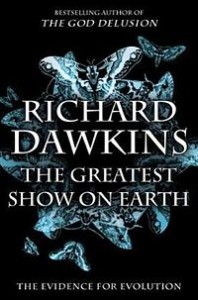“The Greatest Show on Earth”
by David Bentley Hart
Filed under Book Reviews
The Greatest Show on Earth: The Evidence for Evolution
by Richard Dawkins
Free Press, 480 pages, $30
 The first lesson to be learned from Richard Dawkins’ new book is a purely practical maxim: One should always do what one does best, while scrupulously avoiding those tasks for which neither nature nor tuition has equipped one. This is not, obviously, what one could call a moral counsel; it is merely a counsel of prudence. Another way of saying it would be, try not to make a fool of yourself. Of course, folly is something of a relative judgment. It is often the case, especially in the world of publishing, that the most lucrative course is to do things very, very badly. The richest novelists tend to be those who cannot write; and the more poorly they write, the richer they are likely to become. The most successful purveyors of popular history, popular political polemic, popular religion, popular philosophy, popular atheism—and so on—are those who know only as much about their subjects as is necessary to make a stir and absolutely nothing more. And one has to concede that no other book by Richard Dawkins has sold nearly as well as The God Delusion, his majestically maladroit adventure in the realm of abstract ideas. So, weighing things solely in the balances of financial gain, one should perhaps not be too captious regarding his recent publications on the God question.
The first lesson to be learned from Richard Dawkins’ new book is a purely practical maxim: One should always do what one does best, while scrupulously avoiding those tasks for which neither nature nor tuition has equipped one. This is not, obviously, what one could call a moral counsel; it is merely a counsel of prudence. Another way of saying it would be, try not to make a fool of yourself. Of course, folly is something of a relative judgment. It is often the case, especially in the world of publishing, that the most lucrative course is to do things very, very badly. The richest novelists tend to be those who cannot write; and the more poorly they write, the richer they are likely to become. The most successful purveyors of popular history, popular political polemic, popular religion, popular philosophy, popular atheism—and so on—are those who know only as much about their subjects as is necessary to make a stir and absolutely nothing more. And one has to concede that no other book by Richard Dawkins has sold nearly as well as The God Delusion, his majestically maladroit adventure in the realm of abstract ideas. So, weighing things solely in the balances of financial gain, one should perhaps not be too captious regarding his recent publications on the God question.
Still, there was a time when Dawkins enjoyed a deserved reputation for his contributions to the popular exposition of evolutionary science and theory without yet having acquired his entirely undeserved reputation as a powerful advocate for atheism.
The Selfish Gene, despite occasional propositions of an almost metaphysical variety, is, for the most part, an excellent introduction to one of the more fascinating areas of modern biological science and speculation. And, generally, whenever Dawkins has confined himself to topics within his field of expertise, he has produced well-organized, lucidly written guidebooks to the current scene in the life sciences.
With The Greatest Show on Earth, Dawkins has returned to what he does best. He makes occasional mention of subjects he ought not to touch on—Plato, for instance, or the “great chain of being,” or God—with predictable imprecision; but these are only momentary deviations. The purpose of the book is simply to lay out, as clearly as possible, the evidence for the truth of special evolution. It recently occurred to him, he says, that over the years he has written about evolutionary theory but never taken the time to provide his reasons for believing in it for those who have not had the benefit of his training. And this is what he does here, very well, proceeding by discrete steps: the observable plasticity of plant and animal species, the verifiability of macro-evolution, the geological record of the earth’s age, the fossil evidence (including the wealth of fossil remains of intermediate special forms), observable and experimental mutation, morphology, genetics, and so forth. In short, The Greatest Show on Earth is an ideal précis of the evolutionary sciences and the current state of evolutionary theory that can be recommended for the convinced and the unconvinced alike.
Dawkins’ special reason for having written this book, as perhaps need not be said, is his own frustration over the sheer number of persons in the world today who continue to refuse to believe either in special evolution or in its entirely immanent causal mechanisms. Although the book is, for the most part, wholly “positive” in its argument, it is nonetheless explicitly directed toward two targets: young-earth creationists and the intelligent design movement. In regard to the former, of course, he does not really need to expend much energy. After all, ranged against their beliefs is nothing less than the entire universe and every physical datum it comprises. In regard to the latter, however, he does feel the need to exert himself; and, while some of his arguments are solvent enough, others are no more sophisticated than the positions they are meant to refute.
Read the rest of the review.
Related Posts
Note: Our goal is to cultivate serious and respectful dialogue. While it's OK to disagree—even encouraged!—any snarky, offensive, or off-topic comments will be deleted. Before commenting please read the Commenting Rules and Tips. If you're having trouble commenting, read the Commenting Instructions.












